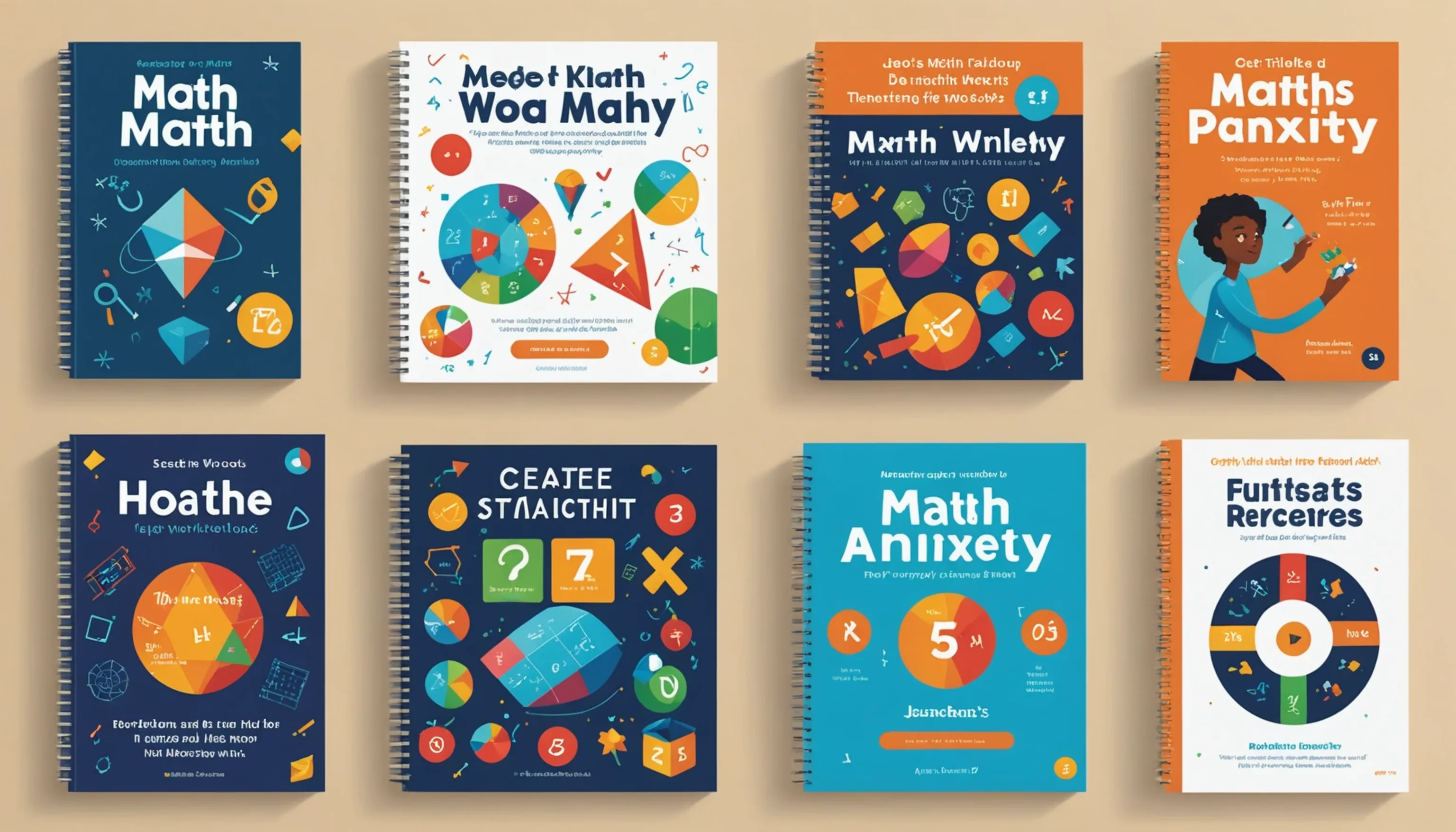Math Anxiety Resources for Parents and Teachers
 HvWHenry van Wagenberg
HvWHenry van Wagenberg
Understanding Math Anxiety in Teens
Math anxiety is a common issue among teenagers that can significantly affect their confidence and performance in mathematics. It refers to the feelings of tension, apprehension, and fear that arise when faced with math-related tasks. This anxiety can stem from various sources, including past negative experiences, societal pressures, and high-stakes testing environments.
Understanding math anxiety is crucial for both parents and teachers, as it helps identify students who may need additional support. By recognizing the signs of math anxiety early on, adults can implement strategies to create a more positive and encouraging atmosphere that fosters mathematical confidence.
What is Math Anxiety?
Math anxiety is defined as a feeling of intense nervousness or fear associated with mathematics. It is not simply a dislike for the subject; rather, it is a psychological condition that can hinder a student's ability to perform well in math-related tasks. This anxiety can manifest in various ways, including physical symptoms like sweating, rapid heartbeat, or stomach discomfort when faced with math problems.
The root causes of math anxiety can be complex and varied. Some teenagers may have had negative experiences with math in the past, such as poor performance on tests or critical feedback from teachers or peers. Additionally, the pressure to perform in a high-stakes environment, such as standardized testing or college entrance exams, can exacerbate feelings of anxiety.
Math anxiety can lead to a cycle of avoidance, where students may skip math classes or procrastinate on assignments, further compounding their difficulties. This can result in lower academic performance, which in turn increases their anxiety, creating a detrimental feedback loop.
Importantly, math anxiety can affect not only students' performance in mathematics but also their overall academic self-esteem. Students may start to perceive themselves as "bad at math," which can have lasting impacts on their educational choices and career aspirations. Understanding what math anxiety is and how it affects teenagers is crucial for parents and teachers, enabling them to provide the support needed to help students overcome these challenges.
Signs of Math Anxiety in Teenagers
Identifying the signs of math anxiety in teenagers is vital for parents and teachers who want to provide appropriate support. The symptoms can manifest in various ways, both emotionally and physically. Understanding these signs can help adults intervene early and foster a more positive attitude towards math.
One of the most common signs is avoidance behavior. Teenagers with math anxiety may shy away from math classes or refuse to participate in math-related activities, often claiming they are too busy or uninterested. They might also procrastinate on assignments or projects involving math, leading to last-minute panic as deadlines approach.
Emotional signs often accompany avoidance. These can include feelings of inadequacy, low self-esteem, or a pervasive fear of failure. Students may express frustration or despair when confronted with math tasks, often saying things like, "I just can't do math" or "I'm not good at it." Such negative self-talk can further contribute to their anxiety.
Physical symptoms are also common. Teenagers may experience headaches, stomachaches, or other stress-related ailments when faced with math challenges. They might exhibit signs of nervousness, such as fidgeting, sweating, or rapid heartbeat during tests or while solving problems in class.
Lastly, poor performance in math, particularly when it seems disproportionate to a student's abilities in other subjects, can be a clear indicator of underlying anxiety. Recognizing these signs is the first step in helping teenagers navigate their math anxiety effectively.
The Impact of Math Anxiety on Academic Performance
Math anxiety can have a profound impact on a teenager's academic performance, often creating a cycle of negative outcomes. When students experience anxiety related to math, it can hinder their ability to concentrate and process information effectively during lessons or tests.
Research indicates that students with high levels of math anxiety tend to perform worse on math assessments compared to their peers who do not experience such anxiety. This is not necessarily due to a lack of understanding or ability; rather, the overwhelming feelings of fear and apprehension can lead to mental blocks during critical thinking and problem-solving tasks. As a result, students may miss questions they would normally answer correctly if they were in a calmer state of mind.
Additionally, math anxiety can affect a student's overall attitude towards school and learning. Persistent feelings of inadequacy can lead to a decline in motivation, not just in mathematics but across other subjects as well. Students may begin to view themselves as "bad at school," which can negatively impact their self-esteem and willingness to engage in academic challenges.
The long-term consequences can be significant. Students who struggle with math anxiety may avoid higher-level math courses, limiting their options for college majors and career paths. This avoidance can create a cycle of underachievement and missed opportunities, making it crucial for parents and educators to address math anxiety early on and provide necessary support and resources.

Effective Strategies for Parents and Teachers
Parents and teachers can implement several effective strategies to help teenagers overcome math anxiety. First, fostering a positive mindset towards math is essential. Encourage students to view mistakes as learning opportunities rather than failures. Providing consistent, constructive feedback can also boost their confidence.
Creating a supportive learning environment is crucial. This can involve offering additional resources, such as tutoring or study groups, and promoting open communication about their feelings towards math. Additionally, teaching relaxation techniques, such as deep breathing or mindfulness, can help students manage their anxiety during math-related tasks.
Creating a Supportive Learning Environment
Creating a supportive learning environment is essential for helping teenagers cope with math anxiety. A nurturing atmosphere can significantly reduce feelings of stress and apprehension associated with mathematics. One of the first steps is to foster open communication. Encourage students to express their feelings about math, allowing them to share their fears and frustrations without judgment. This dialogue can help identify specific triggers and areas where they need support.
Another effective strategy is to promote collaborative learning. Group activities, such as study groups or peer tutoring, enable students to work together, share ideas, and learn from one another. This not only helps them understand the material better but also diminishes the stigma surrounding math difficulties.
In addition, incorporating hands-on, engaging learning experiences can make math more enjoyable. Using real-life applications of math concepts, like cooking or budgeting, can help students see the relevance of math in their daily lives. This practical approach can help alleviate anxiety by making math feel less abstract.
Furthermore, recognizing and celebrating small achievements can build confidence. Whether it's completing a challenging problem or showing improvement on a test, acknowledging these successes reinforces positive feelings towards math.
Lastly, providing resources such as extra tutoring sessions, online tools, or math games can further support students in a pressure-free setting. By actively working to create a supportive learning environment, parents and teachers can play a crucial role in reducing math anxiety and fostering a love for mathematics.
Encouraging a Positive Mindset Towards Math
Encouraging a positive mindset towards math is crucial in helping teenagers overcome math anxiety. A positive attitude can significantly influence how students perceive and engage with mathematical concepts. One effective approach is to frame math challenges as opportunities for growth rather than obstacles. Teach students that making mistakes is a natural part of the learning process and can lead to deeper understanding.
To cultivate this mindset, parents and teachers should use positive reinforcement. Celebrate small victories, such as completing assignments or participating in class discussions. This recognition helps students associate math with success, boosting their confidence and motivation. Additionally, using encouraging language can shift the narrative around math. Phrases like "I believe in your ability to learn this" or "Let's tackle this problem together" can inspire a sense of capability.
Incorporating growth mindset principles can also be beneficial. Encourage students to adopt the belief that intelligence and skills can be developed through effort and practice. This perspective can reduce fear of failure and promote resilience when faced with challenging problems.
Moreover, providing relatable examples of successful individuals who have overcome math anxiety can inspire students. Sharing stories of people who struggled with math but succeeded through persistence can motivate teenagers to change their outlook.
Finally, integrating fun, interactive activities into math lessons can help shift perceptions. Games, puzzles, and real-world applications can make math more enjoyable, reinforcing the idea that math can be both accessible and fun. By fostering a positive mindset, parents and teachers can empower students to embrace math with confidence and enthusiasm.
Resources and Tools for Managing Math Anxiety
Managing math anxiety effectively requires access to various resources and tools. For parents and teachers, the following options can be particularly helpful:
- Books and Workbooks: There are numerous books designed specifically for teens that focus on math skills while addressing anxiety. Titles like "The Math Survival Guide" can provide practical strategies.
- Online Resources: Websites such as Khan Academy and Mathway offer free tutorials and practice problems, allowing students to learn at their own pace.
- Apps: Math-related apps like Photomath and Todo Math can help students understand concepts in an interactive way, reducing anxiety associated with traditional learning methods.
- Workshops: Local community centers or schools may offer workshops focused on math skills and anxiety management techniques.
- Support Groups: Online forums and communities can provide a platform for students to share experiences and coping strategies with peers.

Books and Workbooks for Teens
Books and workbooks specifically designed for teens can play a significant role in managing math anxiety while enhancing their mathematical skills. These resources often combine engaging content with practical exercises, making learning more approachable and enjoyable.
One highly recommended title is The Math Survival Guide by Julie O’Rourke, which offers strategies for overcoming math anxiety and emphasizes building confidence in mathematical abilities. This guide provides practical tips and exercises tailored to high school students, making it an excellent resource for both self-study and classroom use.
Another effective workbook is Math Doesn’t Suck by Danica McKellar. This book tackles middle school and early high school math concepts in a relatable and accessible way. McKellar uses humor and real-life examples to demystify math, helping students to see the subject as less intimidating.
Additionally, The Complete Idiot’s Guide to Algebra can be a valuable resource. It breaks down complex concepts into simpler terms, allowing students to grasp algebraic principles without feeling overwhelmed.
Using these books and workbooks, teens can practice math skills in a low-pressure environment. Encouraging regular engagement with these resources can help reduce anxiety and foster a positive attitude towards math. By integrating fun and relatable content, these materials empower students to confront their fears and improve their mathematical understanding.
Online Resources and Apps
In the digital age, numerous online resources and apps can effectively help teens manage math anxiety while enhancing their skills. These tools provide interactive and accessible learning experiences, making math more engaging and less intimidating.
One of the most popular platforms is Khan Academy, which offers a comprehensive library of instructional videos, practice exercises, and personalized learning dashboards. Students can work at their own pace, allowing them to revisit challenging concepts as needed. This self-directed approach can significantly reduce anxiety by fostering a sense of control over their learning.
Another excellent resource is Photomath, an app that allows students to take pictures of handwritten or printed math problems and provides step-by-step solutions. This tool not only helps with homework but also offers explanations that can clarify concepts and build confidence.
Mathway is another helpful app that provides instant solutions to a wide range of math problems, from basic arithmetic to advanced calculus. It offers detailed explanations, enabling students to understand the processes behind the solutions.
Additionally, websites like IXL provide personalized practice across various math topics, tracking progress and identifying areas for improvement. These resources can offer a low-pressure environment where teens can practice and learn without the fear of judgment.
By utilizing these online resources and apps, students can develop their math skills in a supportive and flexible manner, effectively managing their anxiety and boosting their confidence in mathematics.
Workshops and Support Groups for Parents and Teachers
Workshops and support groups are valuable resources for parents and teachers looking to address math anxiety in teenagers. These programs often provide practical strategies for managing anxiety and improving math skills. Workshops may cover topics such as effective teaching methods, communication techniques, and ways to create a supportive learning environment.
Support groups allow parents and teachers to share experiences and solutions, fostering a community of support. Local community centers, schools, and online platforms frequently offer these workshops and groups, making it accessible for those seeking to enhance their understanding and support of students facing math anxiety.
Finding Local Workshops
Finding local workshops aimed at helping parents and teachers manage math anxiety in teenagers can be an invaluable resource. These workshops provide practical strategies, educational materials, and support networks that can significantly enhance the way adults approach math education and anxiety management.
To locate workshops in your area, start by checking with local schools, community colleges, and educational organizations. Many schools host parent-teacher workshops that focus on various aspects of education, including math anxiety. Community colleges often offer classes or seminars for parents and educators that delve into effective teaching methods and coping strategies for students.
Additionally, educational non-profits and mental health organizations frequently conduct workshops designed to address math anxiety specifically. These organizations may provide resources and training for both parents and teachers, equipping them with the tools needed to support their teenagers effectively.
Online community boards, social media groups, and platforms like Meetup can also be useful in finding local workshops. These platforms often list events, workshops, and support groups tailored to specific interests, including educational support for math anxiety.
Moreover, local libraries and community centers may host workshops or informational sessions on education and mental health topics. Attending these workshops can not only provide valuable information but also create a network of support among like-minded individuals facing similar challenges.
By actively seeking out local workshops, parents and teachers can gain insights and skills that will empower them to help teenagers overcome math anxiety and foster a more positive relationship with mathematics.
Online Support Groups and Communities
Online support groups and communities provide essential resources for parents and teachers aiming to tackle math anxiety in teenagers. These platforms create a space for sharing experiences, strategies, and encouragement among individuals facing similar challenges. The anonymity and accessibility of online groups can be particularly appealing, allowing participants to engage without the pressures often associated with in-person meetings.
Social media platforms like Facebook host numerous groups dedicated to educational support, where parents and educators can connect. These groups often share valuable resources, such as articles, worksheets, and personal success stories. Members can post questions and receive feedback from others who have faced similar situations, fostering a sense of community and shared learning.
Dedicated forums, such as those found on websites like Reddit, provide spaces for discussion and advice. Subreddits focused on education or parenting often have threads dedicated to math anxiety, allowing users to seek advice and share coping strategies in a supportive environment.
Moreover, organizations focused on education and mental health, such as the Anxiety and Depression Association of America (ADAA), often facilitate online support groups. These groups may include scheduled meetings led by professionals who can offer expert insights and guidance on managing math anxiety.
Participating in online support groups and communities can empower parents and teachers with the knowledge and tools to better support teenagers struggling with math anxiety. By sharing experiences and strategies, these groups help create a more informed and supportive environment for students, fostering resilience and confidence in their mathematical abilities.
